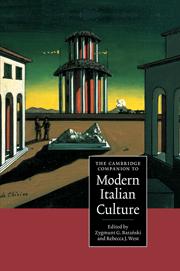Book contents
- Frontmatter
- Introducing modern Italian culture
- 1 The notion of Italy
- 2 Social and political cultures in Italy from 1860 to the present day
- 3 Questions of language
- 4 Intellectuals, culture and power in modern Italy
- 5 Catholicism
- 6 Socialism, Communism and other ‘isms’
- 7 Other voices: contesting the status quo
- 8 Narratives of self and society
- 9 Searching for new languages: modern Italian poetry
- 10 Drama: realism, identity and reality on stage
- 11 Italian cinema
- 12 Art in modern Italy: from the Macchiaioli to the Transavanguardia
- 13 A modern identity for a new nation: design in Italy since 1860
- 14 Fashion: narration and nation
- 15 The media
- 16 Since Verdi: Italian serious music 1860-1995
- 17 Folk music and popular song from the nineteenth century to the 1990s
- 18 Epilogue: Italian culture or multiculture in the new millennium?
- Index
- Series List
8 - Narratives of self and society
Published online by Cambridge University Press: 28 May 2006
- Frontmatter
- Introducing modern Italian culture
- 1 The notion of Italy
- 2 Social and political cultures in Italy from 1860 to the present day
- 3 Questions of language
- 4 Intellectuals, culture and power in modern Italy
- 5 Catholicism
- 6 Socialism, Communism and other ‘isms’
- 7 Other voices: contesting the status quo
- 8 Narratives of self and society
- 9 Searching for new languages: modern Italian poetry
- 10 Drama: realism, identity and reality on stage
- 11 Italian cinema
- 12 Art in modern Italy: from the Macchiaioli to the Transavanguardia
- 13 A modern identity for a new nation: design in Italy since 1860
- 14 Fashion: narration and nation
- 15 The media
- 16 Since Verdi: Italian serious music 1860-1995
- 17 Folk music and popular song from the nineteenth century to the 1990s
- 18 Epilogue: Italian culture or multiculture in the new millennium?
- Index
- Series List
Summary
11 May 1860. Garibaldi lands at Marsala, Sicily, and opens the way for the unification of Italy under Victor Emmanuel II of Savoy, the ‘galantuomo’ King.
[The Prince] opened the newspaper. ‘On May 11 an act of flagrant piracy was effected through the landing of armed men on the Marsala coast. Subsequent reports have clarified that the band numbers about eight hundred, and is commanded by Garibaldi’ [. . .] The name of Garibaldi troubled him a bit. That adventurer, all hair and beard,was a pure Mazzinian. He would cause trouble. ‘But if the Galantuomo [King] has let him come down here it means he’s sure of him. They’ll bridle him.’
The novel is indeed the modern artistic form of the bourgeoisie, but there is no law prohibiting aristocrats from writing in another class's style; so, almost exactly a century after the unification of Italy, a Sicilian prince, Giuseppe Tomasi di Lampedusa (1896-1957), wrote a very successful and revealing novel, Il Gattopardo ('The Leopard', 1958) about the events that led to the decline and eventual demise of the aristocracy. Modelled on the author's grandfather, the protagonist of the book, Prince Fabrizio Salina, witnesses those events with the wisdom and detachment of his age and with a historical and sociological insight that makes him support his nephew, Tancredi Falconeri, when the latter joins the Garibaldini - 'If we want everything to stay as it is, everything has to change' (p. 24), he tells his worried uncle - and when he wants to marry the beautiful bourgeois Angelica Sedara instead of Concetta, the prince's own daughter.
- Type
- Chapter
- Information
- The Cambridge Companion to Modern Italian Culture , pp. 151 - 172Publisher: Cambridge University PressPrint publication year: 2001
- 1
- Cited by



